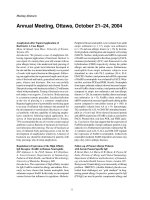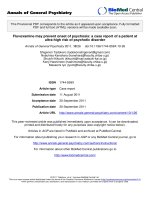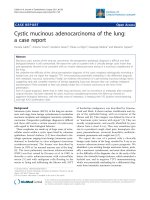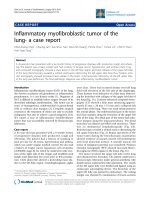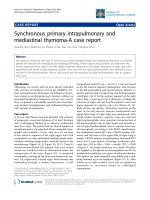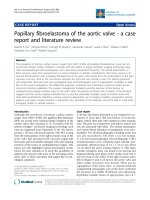Báo cáo y học: " Acute coronary ischemia during alcohol withdrawal: a case report" doc
Bạn đang xem bản rút gọn của tài liệu. Xem và tải ngay bản đầy đủ của tài liệu tại đây (1.83 MB, 4 trang )
CAS E REP O R T Open Access
Acute coronary ischemia during alcohol
withdrawal: a case report
Chaturaka Rodrigo
1*
, Dhanesha Seneviratne Epa
1
, Ganeshalingam Sriram
1
and Saroj Jayasinghe
2
Abstract
Introduction: The potential of alcohol withdrawal to cause acute coronary events is an area that needs the urgent
attention of clinicians and researchers.
Case presentation: We report the case of a 52-year-old heavy-alcohol-using Sri Lankan man who developed
electocardiogram changes suggestive of an acute coronary event during alcohol withdrawal. Despite the patient
being asymptomatic, subsequent echocardiogram showed evidence of ischemic myocardial dysfunction. We
review the literature on precipitation of myocardial ischemia during alcohol withdrawal and propose possible
mechanisms.
Conclusions: Alcohol withdrawal is a commonly observed phenomenon in hospitals. However, the number of
cases reported in the literature of acute coronary events occurring during withdrawal is few. Many cases of acute
ischemia or sudden cardiac deaths may be attributed to other well known complications of delirium tremens. This
is an area needing the urgent attention of clinicians and epidemiologists.
Introduction
The state of alcohol withdrawal is known for its life
threatening complications such as delirium tremens.
Several authors have observed the po tential for it to
cause acute coronary events [1,2], while others have
observed subtle electrocardiogram (ECG) changes in
patients during alcohol withdrawal [3]. We caution that
this ominous complication should be expected and
observed for while managing patients in alcohol with-
drawal. We report the case of a man with acute coron-
ary ischemia during alcohol withdrawal while under our
care.
Case presentation
A 52-year-old Sri Lankan m an was transferred to the
University Medical Unit (UMU) at the National Hospital
of Sri Lanka, Colombo, for management of alcohol with-
drawal. He had been a habitual heavy drinker with a
daily consumption that was approximately 12 to 24
units of alcohol (as arrack, a locally brewed alcoholic
beverage). His pattern of consumption had features of
alcohol dependency such as tolerance, use despite
knowing its harm, withdrawal features, neglect of alter-
nate pleasures and unsuccessful efforts to cut down on
usage.
On the day of admission, he had an episode of transi-
ent loss o f consciousness with a fall and suffered a cut
injury to his face. He was admitted to a surgical ward
for wound care but developed features of alcohol with-
drawal 48 hours after admission and was transferred to
the UMU for further management.
He was restless and disoriented in time, place and per-
son. There was a deep laceration over the left ear that
was sutured. There were no clinical signs suggestive of
hepatic or Wernicke ’s encephalopathy. He was managed
with sedation, oral chlordiazepoxide, intravenous thia-
min and adequate hydration. He did not develop sei-
zures or fever during his stay in t he hospital, and made
a complete clinical recovery from the state of confusio n
within 72 hours.
The ECG on admission was essentially normal and did
not show abnormalities of ischemic heart disease. How-
ever, an ECG on day four (since admission) showed ST
segment depressions in leads L1, L2, V5 and V6 (see
Figure 1). The ECG on day f ive showed similar changes
but they had progressed to significant (more than 2
mm) ST segment depression. The ECG on day six
* Correspondence:
1
University Medical Unit, National Hospital of Sri Lanka, Colombo, Sri Lanka
Full list of author information is available at the end of the article
Rodrigo et al. Journal of Medical Case Reports 2011, 5:369
/>JOURNAL OF MEDICAL
CASE REPORTS
© 2011 Rodri go et al; licensee BioMed Central Ltd. This is an Open Access artic le distributed under the terms of the Creative Com mons
Attribution License ( which permits unrestricted us e, distribution, and reproduction in
any medium, pro vided the original work is properly cited.
showed additional changes of deep T inversions in aVL
and in p recordial leads V2-V6 (see Figure 2). Despite
not having typical chest pain, he was anticoagulated
with low molecular weight heparin (enoxaparin) and
was managed as for an acute coronary event (non inva-
sive treatment strategy).
By this time, he had recovered from his deli rium and
was able to give a full history to assess his cardiovascu-
lar risk status. He had not had any acut e coronary
events in the past or any significant co-morbidity such
as diabetes, hypertension or hypercholesterolemia. There
was no significant family history but he was a heavy
smoker (15 pack-years).
He had undetectable levels of Troponin I (sensitivity
and specificity of app roximat ely 90% at a cut-off of 0.5
ng/ml) on day six since admission. His liver enzyme
levels in serum were elevated (ALT: 138 u/l, AST: 236
u/l). Serum sodium, potassium and creatinine were
within the normal range. His hemoglobin level was 11.3
g/dl. There was no evidenc e of subdural hemorrhage on
computed tomography (CT) scan which is an alternative
cause for confusion and ECG changes. A subsequent
echocardiogram showed septal and apical hypokinesia
with evidence of ischemic left ventricular dysfunction.
He made a full recovery and was discharged on day
ten with clinic follow up arranged. Since he was willing
to abstain from alcohol, he was referred to counseling
services at the University Psychiatry Unit.
Discussion
Our patient showed ECG features of acute coronary
ischemia during alcohol withdrawal. Though these could
be mere coincidental events, there is growing evidence
that supports alcohol withdrawal as a precipitant of
acute coronary events. An accepted hypothesis is cen-
tered on the adrenergic surge occurring at the time of
withdrawal [4]. The adrenergic stimulation to coronaries
has a twofold action in the normal physiologic state:
direct coronary vasoconstriction via a receptors and sec-
ondary coron ary vasodilation via b receptors on the
myocardium. Vasoconstriction occurring through a
receptors (cutting down the coronary flow) is only tran-
sient. The b receptor stimulation increases the contracti-
lity of the myo cardium which in turn increases the
Figure 1 The ECG on day 4. ST segment depressions are visible in leads L1, L2, V5 and V6.
Rodrigo et al. Journal of Medical Case Reports 2011, 5:369
/>Page 2 of 4
production of vasodilatory metabolites. This causes a
secondary dilation of coronary vessels leadi ng to a net
improvement in flow. Perivascular fibrosis and intra-
myocardial artery sclerosis that can potentially cause
small vessel disease that limits the ability of the vessels
to dilate at the time of an adrenergic crisis have been
demonstrated in alcoholics [5]. This may precipitate an
acute coronary event in a susceptible heart that is
already damaged by long term alcohol use. Other the-
ories suggest that magnesium deficiency and autonomic
neuro pathy (observed to occur with chronic alcoholism)
derail the regulation of coronary vessels at a time of
adrenergic crises which can precipitate an obstruction to
flow [6,7].
The cause for the initial loss of consciousness and fall
in this man is worth exploring. One possible explanation
is that a transient arrhythmia precipitated the fall.
Recent animal studies have shown that there is an
imbalance between cardiac sympathetic and parasympa-
thetic drive towards sympathetic predominance that
potentially increases the risk for fatal arrhythmias during
alcohol withdrawal. The degree of imbalan ce correlates
with the non-homogeneity of cardiac repolarization
[8,9]. These studies have also demo nstrated a potential
place for beta blocker pretreatment in reducing the
repolarization abnormalities. In a case control study of
human subjects Bar et al.havedemonstratedthatthe
QT interval is significantly prolonged in patients in
acute alcohol withdrawal increasing the repolarization
vulnerability of the myocardium. Authors assume that
this prolongation is related to the sympathetic over
activity during withdrawal [10]. The phenomenon of QT
interval prolongation during alcohol wit hdrawal has also
been investigated by Cuculi et al. [11]. They showed
tha t in a sample of 49 patients with alcohol withdrawal,
the majority (63%) had significant QT interval prolonga-
tion on ECG. T he types of arrhythmias observed in this
retrospective analysis included torsade de pointes, sus-
tained ventricular tachycardia, atrial fibrillation and
supraventricular tachycardia. Several others have also
reported instances of QT interval prolongation in alco-
hol withdrawal including a case report of a neonate of
an alcohol dependent mother developing QT interval
prolongation and ventricular tachycardia after birth
Figure 2 The ECG on day 6. There are additional changes of deep T inversions in leads aVL, V2-V6.
Rodrigo et al. Journal of Medical Case Reports 2011, 5:369
/>Page 3 of 4
[12,13]. In addition to sympathetic over activity, there
are many other contribut ory factors that may cause QT
interval prolongation in a patient in alcohol withdrawal
such as electrolyte disturbances, concurrent use of neu-
roleptics (for purposes of sedation) and renal and/or
hepatic dysfunction. Although QT interval prolongation
was not observed in our patient after hospital admission,
the possibility of a transient arrhythmia precipitating the
initial fall cannot be excluded.
While there are many plausible theories for vulnerab il-
ity to acute coronary syndromes during alcohol withdra-
wal, clinical evidence for such an association is limited.
Denison et al. [3] report ST segment changes in a case
series of 19 men being treated for alcohol withdrawal.
Seven patients in this case series had significant horizon-
tal or down-sloping ST segment changes without any
chest pain. Our patient did not have biochemical evi-
dence of myocardial injury but Danenberg et al. reports a
case in which a previously healthy i ndividual had devel-
oped myocardial infarction during alcohol withdrawal
[2]. There are only a few other reported cases where
acute alcohol withdrawal is linked to acute coronary
events and sudden cardiac death [1,14,15]. We have
searched PUBMED with key words ‘deliri um tremens’ or
‘ alcohol withdrawal’ with ‘ acute coronary syndrome’
appearing anywhere in the article and repeated the same
search in Google Scholar (there were no time limits to
thesearch).Whileacutecoronaryischemiaisalikely
sequelae of alcohol withdrawal, given the observation of
QT interval prolongation and arrhyth mias in the studies
quoted above, the significance of arrhyt hmias as a cause
of sudden cardiac deaths must be considered as well.
Conclusions
Given the fact that alcohol withdrawal is a commonly
observed phenomeno n in hospitals and the potential
vulnerability to sudden cardiac death during withdrawal,
the number of cases reported in the literature is few. It
brings forth the question whether clinicians are actively
observing for this potentially lethal complication of
acute alcohol withdrawal. Many cases of acute ischemia
or sudden cardiac deaths may go unnoticed and be
attributed to other well-known complications of delir-
ium tremens. This is an area that needs the urgent
attention of researchers, epidemiologists and clinicians
to establish the impact of acute alcohol withdrawal on
cardiac morbidity and mortality.
Consent
Written informed consent was obtained from the patient
for publication of this case report and any accompany-
ing images. A copy of the written consent is available
for review by the Editor-in-Chief of this journal.
Author details
1
University Medical Unit, National Hospital of Sri Lanka, Colombo, Sri Lanka.
2
Department of Clinical Medicine, Faculty of Medicine, University of
Colombo, Sri Lanka.
Authors’ contributions
All authors participated in designing, article search, information coding and
writing of the manuscript.
Competing interests
The authors declare that they have no competing interests.
Received: 9 January 2011 Accepted: 12 August 2011
Published: 12 August 2011
References
1. Gawlikowski T, Biedroń W, Hubalewska-Dydejczyk A, Pach D: Withdrawal
syndrome complicated with heart left ventricle dysfunction in young
woman addicted to alcohol. Przegl Lek 2007, 64:290-292.
2. Danenberg HD, Nahir M, Hasin Y: Acute myocardical infarction due to
delirium tremens. Cardiology 1999, 92:144.
3. Denison H, Jern S, Jagenburg R, Wendestam C, Wallerstedt S: ST-segment
changes and catecholamine-related myocardial enzyme release during
alcohol withdrawal. Alcohol Alcohol 1997, 32:185-194.
4. Linnoila M, Mefford I, Nutt D, Adinoff B: NIH conference. Alcohol
withdrawal and noradrenergic function. Ann Intern Med 1987,
107:875-889.
5. Factor SM: Intramyocardial small-vessel disease in chronic alcoholism.
Am Heart J 1976, 92:561-575.
6. Friesinger CG: Silent myocardial ischemia and the importance of
coronary vasoconstriction. Curr Opin Cardiol 1989, 4:492-498.
7. Purvis JR, Movahed A: Magnesium disorders and cardiovascular diseases.
Clin Cardiol 1992, 15:556-568.
8. Shirafuji S, Liu J, Okamura N, Hamada K, Fujimiya T: QT interval dispersion
and cardiac sympathovagal balance shift in rats with acute ethanol
withdrawal. Alcohol Clin Exp Res 2010, 34:223-230.
9. Liu J, Shirafuji S, Fujimiya T: Rats in acute withdrawal from ethanol exhibit
left ventricular systolic dysfunction and cardiac sympathovagal balance
shift. Alcohol 2009, 43:207-216.
10. Bär KJ, Boettger MK, Koschke M, Boettger S, Grotelüschen M, Voss A,
Yeragani VK: Increased QT interval variability index in acute alcohol
withdrawal. Drug Alcohol Depend 2007, 89:259-266.
11. Cuculi F, Kobza R, Ehmann T, Erne P: ECG changes amongst patients with
alcohol withdrawal seizures and delirium tremens. Swiss Med Wkly 2006,
136:223-227.
12. Otero-Antón E, González-Quintela A, Saborido J, Torre JA, Virgós A, Barrio E:
Prolongation of the QTc interval during alcohol withdrawal syndrome.
Acta Cardiol 1997, 52:285-294.
13. Krasemann T: QT prolongation in the newborn and maternal alcoholism.
Cardiol Young 2004, 14:565-566.
14. Yoshida K, Funahashi M, Masui M, Ogura Y, Wakasugi C: Sudden death of
alcohol withdrawal syndrome–report of a case. Nihon Hoigaku Zasshi
1990, 44:243-247.
15. Bartrug B, Fullwood J, Rogers L, Bride W:
Delirium tremens in acute
myocardial infarction. Heart Lung 1994, 23:21-26.
doi:10.1186/1752-1947-5-369
Cite this article as: Rodrigo et al.: Acute coronary ischemia during
alcohol withdrawal: a case report. Journal of Medical Case Reports 2011
5:369.
Rodrigo et al. Journal of Medical Case Reports 2011, 5:369
/>Page 4 of 4
